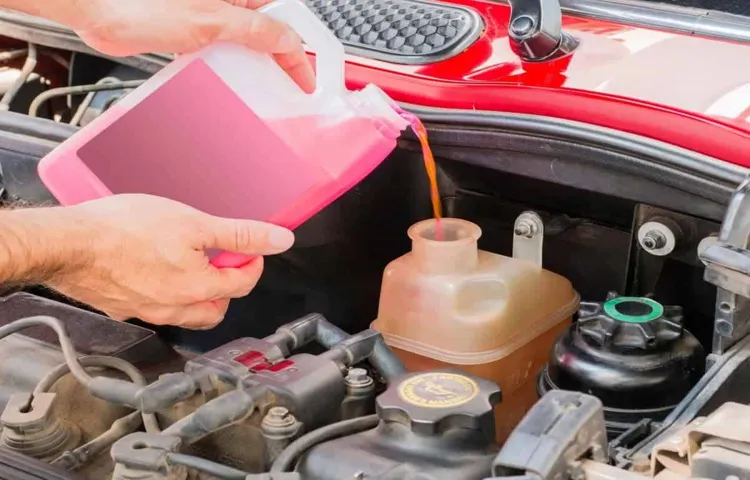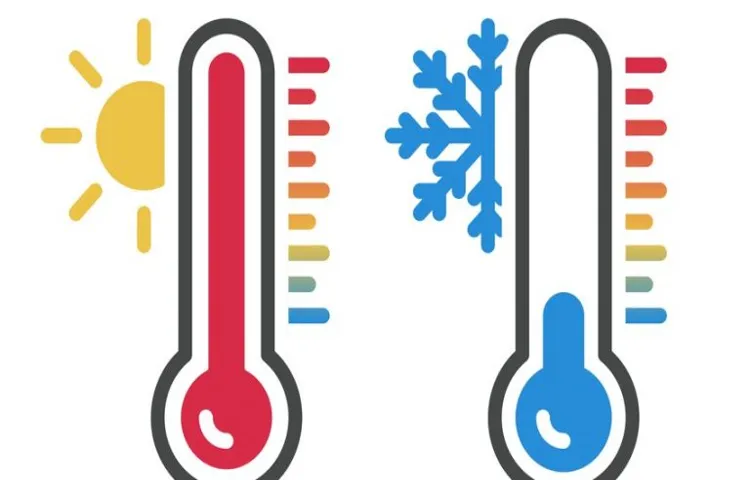Have you ever noticed that your car’s temperature gauge is showing a higher than normal reading? It’s not uncommon for drivers to panic when they see the word “coolant temperature high” flash across their dashboard. But what does it really mean? And more importantly, what should you do about it? Think of your car’s engine as a human body. Just like our bodies, engines need to maintain a certain temperature in order to function properly.
The coolant temperature gauge in your car measures the temperature of the engine coolant, which helps keep the engine cool and prevents it from overheating. When the coolant temperature is high, it typically means that the engine is running hotter than it should be. This can be caused by a variety of factors, including a malfunctioning thermostat, a coolant leak, or a problem with the radiator.
So what should you do if you see that coolant temperature warning light? First, don’t panic. Pull over to a safe location as soon as possible and turn off your engine. This will help prevent any further damage to your engine.
Next, let your engine cool down for a while before opening the hood. This will help prevent you from getting burned by hot coolant or steam. Once it’s safe to do so, check your coolant levels.
If they’re low, you may need to add more coolant. However, if you notice a coolant leak, it’s best to seek professional help. Remember, driving with high engine coolant temperatures can lead to serious engine damage.
If you continue to see the coolant temperature warning light even after taking these steps, it’s important to have your car inspected by a qualified mechanic. In conclusion, seeing the message “coolant temperature high” on your car’s dashboard can be concerning, but it’s important to remain calm and take the necessary steps to prevent further damage. By understanding what this message means and knowing how to respond, you can help keep your engine running smoothly and prevent costly repairs in the future.
Table of Contents
Understanding the Coolant System
Have you ever noticed that warning light on your dashboard that says “coolant temperature high”? It’s not something you should ignore. Your vehicle’s coolant temperature is crucial for the proper functioning of your engine. So, what does it mean when the coolant temperature is high? Essentially, it means that the engine is getting too hot, and this can lead to serious problems if not addressed.
The coolant system in your car is responsible for regulating the temperature of the engine. It circulates coolant, a mixture of water and antifreeze, through the engine and radiator to keep things cool. When the coolant temperature is high, it indicates that the engine is not being properly cooled.
This could be due to a variety of reasons, such as a malfunctioning thermostat, a coolant leak, or a problem with the radiator or water pump. Ignoring a high coolant temperature warning can result in engine damage or even a complete breakdown. When an engine gets too hot, it can warp or crack important components, leading to expensive repairs.
It can also cause the engine to overheat and shut down, leaving you stranded on the side of the road. If you notice that the coolant temperature is high, it’s important to take action immediately. First, pull over to a safe location and turn off the engine.
Allow it to cool down before attempting to open the hood. Never attempt to remove the radiator cap when the engine is still hot, as the coolant can be under pressure and cause burns. Once the engine has cooled down, check the coolant level.
If it’s low, you may need to add coolant. However, if the coolant level is fine, it could indicate a more serious problem that requires professional attention. It’s always best to consult a mechanic if you’re unsure.
What is coolant?
coolant system, coolant

What is the role of coolant in the engine?
coolant system, role of coolant, engine cooling, overheating, heat transfer, radiator, antifreeze When it comes to the engine, one crucial component that often gets overlooked is the coolant. But what exactly does it do and why is it so important? Well, let’s dive into the world of the coolant system and understand its role in keeping our engines running smoothly. The coolant system is designed to manage the heat generated by the engine.
As the engine runs, it produces a tremendous amount of heat, which if not regulated, can lead to various issues such as overheating and damage to engine components. This is where the coolant comes in. The coolant, also known as antifreeze, circulates through the engine and absorbs the excess heat.
Think of the coolant system as a lifeline for your engine. When the engine heats up, the coolant absorbs the heat and carries it away to the radiator. Inside the radiator, the heat is transferred to the surrounding air, thus cooling down the engine.
Without the coolant system, your engine would be prone to overheating, which can cause significant damage and even complete engine failure. But it’s not just about cooling the engine. The coolant also plays a vital role in keeping the engine running efficiently.
By constantly circulating through the engine, the coolant helps maintain a stable temperature, which is crucial for optimal performance. It also prevents the formation of rust and corrosion, which can lead to costly repairs down the line. In addition, the coolant offers protection against freezing during cold weather.
This is particularly important for those living in colder climates. Without a proper antifreeze, the coolant can freeze inside the engine, causing it to crack and resulting in catastrophic engine failure. So, the next time you see that colorful liquid inside your car’s radiator, remember how important it is for your engine’s well-being.
Signs of High Coolant Temperature
If you see that your coolant temperature is unusually high, it could be a sign that there’s an issue with your vehicle’s cooling system. Coolant, also known as antifreeze, helps regulate the engine’s temperature and prevent it from overheating. When the temperature gauge shows that the coolant temperature is high, it means that the engine is running hotter than normal.
This could be caused by a variety of problems, such as a malfunctioning thermostat, a leak in the cooling system, or a problem with the radiator. It’s important to address this issue as soon as possible, as running the engine at high temperatures can lead to more serious and costly damage. If you notice any of these signs, it’s best to have your vehicle inspected by a qualified mechanic to diagnose and fix the issue before it gets worse.
Visible smoke or steam from the engine
“Visible smoke or steam from the engine”
Dashboard warning lights
dashboard warning lights, signs of high coolant temperature
Engine overheating
“coolant temperature” Your car’s engine is like the heart of your vehicle, keeping it running smoothly and efficiently. But just like a heart, an engine can overheat if it’s not properly cared for. One of the tell-tale signs that your engine is getting too hot is a rise in coolant temperature.
Coolant, also known as antifreeze, helps regulate the temperature of your engine by absorbing heat and transferring it to the radiator. If the coolant temperature starts to climb, it’s a clear indication that something is amiss. So, how can you tell if your coolant temperature is too high? Well, one surefire sign is the warning light on your dashboard.
Most modern cars are equipped with a temperature gauge that will light up if the coolant temperature goes beyond the normal range. This is an important indicator that you should never ignore. Additionally, you may notice steam or smoke coming from under the hood, a strong smell of burning coolant, or an unusual noise coming from your engine.
These are all red flags that your coolant temperature is too high and your engine may be overheating. When your engine overheats, it can cause serious damage if not addressed promptly. The excessive heat can warp cylinder heads, damage the pistons, and even crack the engine block.
This can lead to expensive repairs or even complete engine failure. So, if you notice any signs of high coolant temperature, it’s important to take immediate action. Pull over to a safe location, turn off your engine, and let it cool down.
It’s also a good idea to check the coolant level and make sure there are no visible leaks. Preventing engine overheating starts with basic maintenance. Regularly check your coolant level and top it up if needed.
Causes of High Coolant Temperature
“What does coolant temperature high mean?” When the coolant temperature in your vehicle is high, it means that the engine is running hotter than it should be. This can be a cause for concern as it can lead to engine damage if not addressed. There are several possible causes for high coolant temperature, including a malfunctioning thermostat, a leak in the cooling system, a faulty radiator fan, or a problem with the water pump.
In some cases, it could also be due to an overheating engine due to excessive load or driving conditions. It’s important to have your vehicle inspected by a professional if you notice the coolant temperature gauge reaching abnormally high levels to prevent further damage and maintain the health of your engine.
Low coolant level
Low coolant level is a common cause of high coolant temperature in a vehicle. When the coolant level is low, there is not enough coolant to effectively regulate the temperature of the engine. This can lead to the engine overheating and causing potential damage.
There are several reasons why the coolant level may be low. One possibility is a coolant leak. This could be due to a faulty radiator, a loose hose, or a cracked engine block.
Another reason could be a malfunctioning coolant reservoir or a failed coolant pressure cap. Additionally, low coolant level could be the result of improper maintenance, such as failing to check and add coolant regularly. It is important to address a low coolant level as soon as possible to prevent further damage to the engine.
Regular maintenance and inspections can help to catch low coolant levels early and prevent potential issues.
Malfunctioning thermostat
One common cause of high coolant temperatures in a vehicle is a malfunctioning thermostat. The thermostat is a small valve that controls the flow of coolant through the engine. When the engine is cold, the thermostat remains closed, preventing the coolant from circulating.
This allows the engine to warm up quickly. Once the engine reaches its optimal operating temperature, the thermostat opens and allows coolant to flow through the engine, keeping it cool. However, if the thermostat becomes stuck in the closed position, it can prevent the coolant from flowing effectively, causing the engine to overheat.
This can be caused by a variety of factors, such as a faulty thermostat, a buildup of debris or corrosion, or a problem with the thermostat housing. If you notice that your engine temperature is consistently running high, it’s important to have your thermostat checked and repaired if necessary to prevent further damage to your engine.
Radiator issues
One common issue that can arise with radiators is high coolant temperature. This can be caused by a variety of factors, but one of the most common culprits is a malfunctioning thermostat. The thermostat is responsible for regulating the flow of coolant through the radiator, and if it becomes stuck in the closed position, it can cause the coolant to overheat.
Another possible cause of high coolant temperature is a faulty radiator cap. The radiator cap is designed to maintain pressure in the cooling system, and if it fails to do so, it can cause the coolant to boil and overheat. Additionally, a blocked or clogged radiator can also lead to high coolant temperature.
When debris and sediment build up in the radiator, it can restrict the flow of coolant and prevent it from effectively dissipating heat. Finally, a malfunctioning water pump can also contribute to high coolant temperature. The water pump is responsible for circulating coolant through the engine and radiator, and if it fails, it can cause the coolant to become stagnant and overheated.
It is important to address these issues promptly to avoid further damage to the engine and to ensure that the radiator is functioning properly.
Effects of High Coolant Temperature
When your car’s coolant temperature is high, it means that the engine is running hotter than it should be. This can have several negative effects on your vehicle. Firstly, high coolant temperature can lead to overheating, which can cause serious damage to the engine.
Overheating can warp the engine’s components, leading to costly repairs or even complete engine failure. Additionally, high coolant temperature can also cause issues with the cooling system itself. Excessive heat can cause hoses to deteriorate and leak, leading to a loss of coolant and further contributing to overheating.
It’s important to address high coolant temperature as soon as possible to prevent further damage to your vehicle.
Possible engine damage
“Possible engine damage” The effects of high coolant temperature on your engine can be quite concerning and potentially damaging. When the coolant temperature rises too high, it can cause a variety of issues that can lead to engine damage. One of the main effects is an increase in pressure and stress on the engine components.
This can result in overheating, which can then lead to warping or cracking of the engine block, cylinder head, or other important parts. Additionally, high coolant temperature can also cause the engine oil to break down more quickly, leading to decreased lubrication and increased friction. This can result in accelerated wear and tear on moving parts, which can ultimately lead to engine failure.
It’s crucial to monitor your coolant temperature regularly and address any issues promptly to prevent potential costly damage to your engine.
Reduced engine performance and fuel efficiency
If the coolant temperature in your car’s engine is too high, it can have several negative effects on the performance and fuel efficiency of your vehicle. One of the main consequences of high coolant temperature is reduced engine performance. This can occur because high temperatures can cause the engine to operate inefficiently, leading to a decrease in power output.
This decrease in performance can be particularly noticeable when accelerating or climbing hills, as the engine may struggle to generate the necessary power. Additionally, high coolant temperatures can also negatively impact fuel efficiency. When the engine is running hotter than normal, it requires more energy to keep it cool, which can result in increased fuel consumption.
This means that your car may need to burn more fuel to maintain the same level of performance, leading to decreased fuel efficiency. Ultimately, both reduced engine performance and fuel efficiency can have a significant impact on the overall driving experience and can also result in increased fuel costs. That’s why it’s important to monitor your car’s coolant temperature and address any issues as soon as possible to prevent these negative effects.
Increased risk of breakdown
High coolant temperature can have detrimental effects on your vehicle and increase the risk of breakdowns. When the coolant temperature rises beyond normal levels, it can cause various issues. One of the most common problems is the overheating of the engine.
Excessive heat can cause the components of the engine to expand and warp, leading to leaks, cracks, and ultimately, engine failure. Additionally, high coolant temperature can also put a strain on other parts of the vehicle, such as the radiator, hoses, and gaskets. Over time, this can lead to wear and tear, increasing the likelihood of leaks and further damage.
Moreover, when the coolant temperature is too high, the cooling system may not be able to effectively dissipate the heat from the engine, resulting in poor performance and reduced fuel efficiency. It is important to address and regulate high coolant temperature promptly to minimize the risk of breakdowns and avoid costly repairs in the long run.
What to Do When Coolant Temperature is High
If you notice that the coolant temperature in your car is high, it could be an indication of a potential problem with your vehicle. Coolant temperature refers to the temperature of the engine coolant, which is responsible for preventing the engine from overheating. When the coolant temperature is high, it means that the coolant is not effectively cooling down the engine.
This could be due to a variety of reasons, such as a malfunctioning thermostat, a coolant leak, or a blocked radiator. It is important to address the issue promptly to avoid further damage to the engine. You should pull over safely and turn off the engine to give it time to cool down.
Once it has cooled down, you can check the coolant level and inspect for any visible signs of leaks. If you are unsure about how to handle the situation, it is best to call a professional mechanic for assistance. Remember, it is always better to be safe than sorry when it comes to your vehicle’s coolant temperature.
Pull over and let the engine cool down
coolant temperature, engine cool down, high coolant temperature, overheating, pull over and let the engine cool down
Check coolant level
check coolant level, high coolant temperature, overheating engine, radiator coolant Have you ever noticed the temperature gauge on your car’s dashboard climbing higher than usual? This could be a sign that your coolant level is too low, which can lead to an overheating engine. When the coolant level is low, it’s important to check it as soon as possible to avoid any further damage to your vehicle. Checking the coolant level is a simple task that can be done by anyone, even if you’re not particularly car-savvy.
First, make sure your engine is cool before opening the radiator cap. Then, locate the radiator and carefully remove the cap. Take a look inside and see if the coolant level is near the “full” mark.
If it’s below the recommended level, you’ll need to add more coolant. Be sure to use the correct type of coolant for your vehicle, and remember to only add coolant to the radiator when the engine is cold. If you’re unsure about your coolant level or if your engine continues to overheat even after adding coolant, it’s best to seek the expertise of a professional mechanic.
They can diagnose any underlying issues and provide the necessary repairs to keep your engine running smoothly.
Inspect the radiator and thermostat
coolant temperature, radiator, thermostat
Visit a professional mechanic if necessary
coolant temperature, high coolant temperature, professional mechanic, visit a mechanic, high engine temperature
Conclusion
Coolant temperature high is like our engine’s way of saying, “Hey, I’m feeling a little hot under the hood!” It’s basically a red flag that tells us something is not right in the cooling system department. Just like how we sweat when we get overheated, the coolant helps regulate the engine’s temperature by circulating through a series of pipes and a radiator. So, when the coolant temperature skyrockets, it’s like a thermometer saying, “Dude, you better cool down ASAP!” Ignoring this warning could potentially lead to a steaming hot mess of engine damage, so it’s important to take immediate action.
It’s time to channel our inner MacGyver and address the issue before it spirals out of control. Whether it’s a malfunctioning thermostat, a leaky radiator, or a lack of coolant, we need to diagnose and resolve the problem pronto. So, next time your car has a case of the “coolant temperature high”, remember to keep your cool, find a solution, and keep your engine purring like a contented cat.
“
FAQs
What does it mean when the coolant temperature is high?
When the coolant temperature is high, it usually indicates that there is a problem with the cooling system. This could be a result of low coolant levels, a malfunctioning thermostat, a faulty radiator, or a blocked coolant passage. It is important to address this issue promptly to prevent engine overheating and potential damage.
How can I check if my coolant levels are low?
To check if your coolant levels are low, first ensure that the engine is cool. Then locate the coolant reservoir, usually labeled with a “coolant” symbol. The coolant level should be within the MIN and MAX marks on the reservoir. If it is below the MIN mark, add the appropriate coolant mixture (usually a 50/50 mix of coolant and water) until it reaches the MAX mark.
What could be the cause of a malfunctioning thermostat?
A malfunctioning thermostat can be caused by several factors. It may be due to a buildup of dirt or debris, a sticking thermostat valve, or a broken spring. Additionally, a faulty temperature sensor can also affect the thermostat’s performance. If you suspect a malfunctioning thermostat, it is recommended to have it inspected and replaced if necessary by a qualified mechanic.
Can a faulty radiator cause the coolant temperature to rise?
Yes, a faulty radiator can cause the coolant temperature to rise. A radiator may become clogged or damaged, preventing the proper circulation of coolant through the cooling system. This can result in poor heat dissipation and overheating of the engine. It is important to have a damaged radiator repaired or replaced to maintain the proper functioning of the cooling system.
What are the signs of a blocked coolant passage?
Signs of a blocked coolant passage include overheating of the engine, fluctuating coolant temperature, coolant leaks, and a decrease in heater performance. If you suspect a blocked coolant passage, it is recommended to have the cooling system inspected and flushed by a professional to remove any obstructions and restore proper coolant flow.
Can driving with a high coolant temperature damage the engine?
Yes, driving with a high coolant temperature can potentially damage the engine. Excessive heat can lead to engine overheating, which can cause various problems such as warped cylinder heads, blown head gaskets, and even engine seizure. It is crucial to address any issues relating to high coolant temperature promptly to prevent costly engine damage.
How can I prevent the coolant temperature from rising too high?
To prevent the coolant temperature from rising too high, it is important to maintain proper coolant levels, ensure the cooling system is free from leaks, regularly inspect and replace the thermostat if necessary, and keep the radiator and the surrounding components clean and free from debris. Additionally, following the manufacturer’s recommended maintenance schedule and avoiding driving in extreme conditions can also help prevent overheating.



